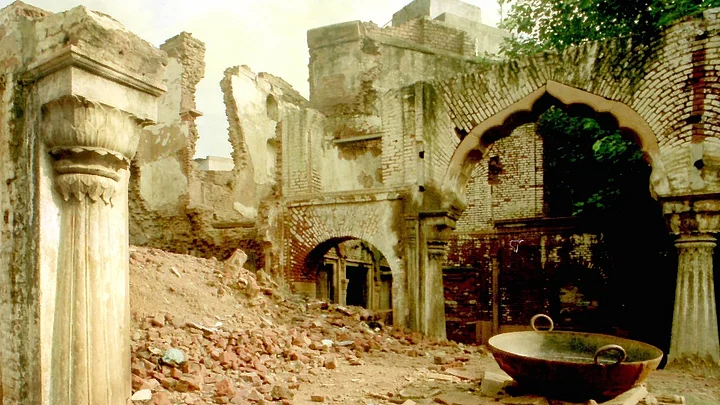At first glance, Sitaram bazaar’s narrow lanes indicate nothing about the trove of history it houses.
But this narrow lane might have very well seen the wedding party of a young Jawaharlal Nehru amble along, with the country’s first Prime Minister sitting atop a horse, dressed as a bridegroom.
Pandit Nehru married a 17-year-old Kamala Kaul from the Haksar Haveli in this locality, in 1916.
Now, over a 100 years after the Nehru-Kaul wedding, the Haveli has again come in the spotlight, following the Delhi High Court’s order on 4 April staying an illegal construction on the site.
Kaul’s Kashmiri-Pandit family lived in the Haveli, after migrating from their homeland in the 1850s. Once a hotbed for mushairas and other musical events, the Haveli has today been reduced to rubble of stones.
It is no wonder that many locals who reside in the bylanes of this crowded Delhi-6 neighbourhood, barring a few old-timers, are unaware of the Haveli’s existence.
Seated in a rusty shop is one such old-timer Parmanand, a curd-churner.
“It's called Dhamaani market now. Nobody knows it as Nehru’s Haveli anymore”, he says, as he maps out the route to the now nondescript structure.
Asked about the Haveli, he shrugs and says, “Nehruji got married there. But nobody knows what happened after; there are no records, no stories”.
In Dhamaani market, queries on the Haksar Haveli are met with blank stares, vague directions and nonchalant shrugs.
A little digging around leads the way to a pharmaceutical distributor, yet another old-timer like Parmanand.
AK Sethi, a resident of Sitaram bazaar for 45 years, too is unsure of the current owners of the property. He says:
The property was sold off by the family in 1962 to some Jaipur-based people. No one knows how many hands the property has been through since then. It is all debris now, who cares anymore?
And true to Sethi’s word, there is nothing left to see in the property.
The Haveli’s remains bear no pretense of a glorious past. Replete with garbage and overgrown shrubs, the compound has been closed to the public.
However, the Haveli’s rundown condition is not new, and had in fact persisted for at least fifty years.
“The Haveli has been in ruins for as long as I've known it, and I've been here for the last fifty years”, says Ramkumar Sharma, who owns the sweet shop adjacent to the compound.
Right next to Sharma's sweet shop is a gate leading to the property, which is locked with boards put up against its front.
The other entrance to the Haveli is two stalls away. Bigger than the first entrance, this gateway is locked as well, and has remained so for a very long time, claims Mohammed Shakil.
Shakil runs a tea stall right outside the locked gate. “I don't know who locked this gate, but it has always been this way”, he says.
Behind Shakil’s tea-stall is Jain Khan’s residence, who’s terrace overlooks the debris-ridden plot. Fairly new to the locality, Khan has lived in his newly-built house only for the last five years.
But the locality has always seen some construction work or the other, ever since he moved in, he alleges.
“There have at least been three owners to this plot. There is always some construction work happening”, Shakil says, pointing to the half-built structure on the premises.
“The builder mafia present here is running a racket. Work has been happening on this plot for the last month or so. Now that the court has stayed the construction and passed an order, they’ve sealed off the plot and put it under lock”, he says, his voice dropping a few notches.
Meanwhile, outside the erstwhile Haveli’s vast premises, a stark contrast comes alive as the locals in the Old Delhi neighbourhood carry on with their businesses, scooters and rickshaws jostling for space on the crowded bazaar’s lanes.
(At The Quint, we question everything. Play an active role in shaping our journalism by becoming a member today.)
